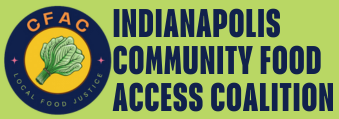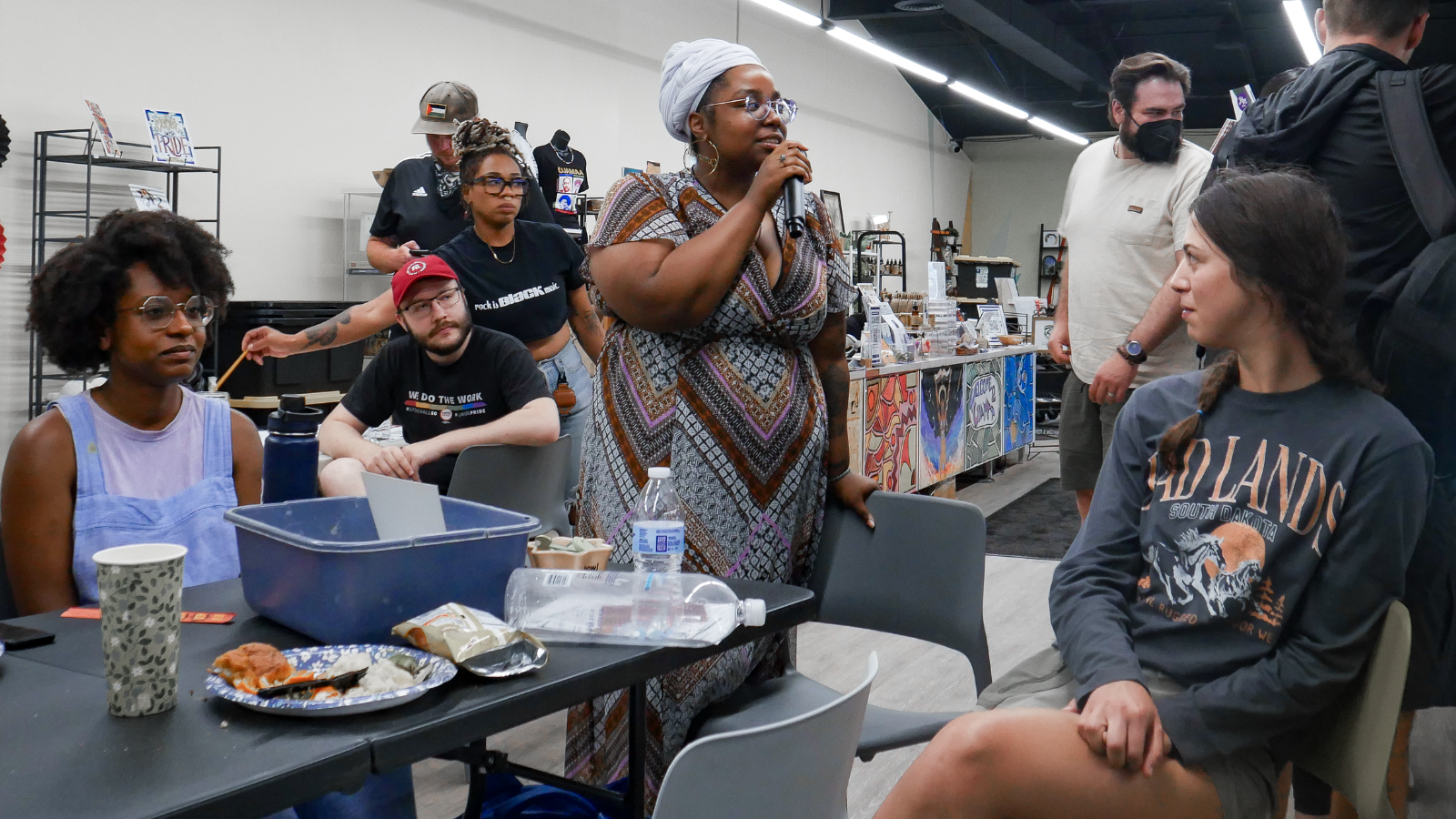The following article on the new Community Food Access Coalition was first published by Mirror Indy on July 12, 2024.
The City-County Council established a food access coalition in 2021, but not much happened until this May.
Sitting in a circle of chairs at the downtown Indianapolis Liberation Center on a Tuesday evening in June, more than a dozen advocates for food access deliberated details they felt like should have been taken care of long before then.
A mission statement, bylaws, fiscal sponsors.
The group recently formed the Indianapolis Community Food Access Coalition, a body city-county councilors laid the groundwork to establish more than three years ago.
Some are frustrated it took so long to create the coalition and do all of the bureaucratic work that comes before actually helping feed people. And there are competing narratives about why it took so long to formalize the group.
From the city’s perspective, these things take time and the group’s existence is a welcome development as local government officials and nonprofit leaders continue a push to make healthy food more accessible.
From the coalition’s viewpoint, though, the three-year delay is a leadership failure, an example of city government and an oversight commission dragging their feet and not taking the problem seriously enough.
In 2022, the most recent year for which data is available, almost 150,000 Indianapolis residents lived in areas without reliable access to healthy food—known as food deserts—according to data from The Polis Center at IU Indianapolis.
“It says a lot about the government and how they are not really where the people are,” coalition member Dani Abdullah told Mirror Indy after the June 18 meeting. “The people are ready to take action.”
Alexis Weaver, assistant director of social determinants of health with the Office of Public Health and Safety, said there’s been a “ramp up” to building a coalition and that formalities now are taking shape.
“There’s been a ton of folks involved in that over the years,” she said.
The coalition formed in May during a community input session hosted by Julie Burns, CEO of a children’s health advocacy group, Jump IN for Healthy Kids.
The meeting was supposed to be about how to better communicate with residents and how to form a coalition, but some who attended said they were tired of only talking about food access and decided to create the coalition on their own.
They elected a president, vice president, treasurer and secretary.
Since then, the group has spent most of its early days in an organizing phase but now is starting to go public, including through a recent community potluck at Flanner House.
The coalition is set to take one of its biggest steps yet by announcing recommendations for members to be appointed to the Indianapolis Community Food Access Advisory Commission.
The commission’s responsibilities include suggesting policies related to food access to city-county councilors. It also is tasked with guiding grants and other funding to organizations that address food insecurity.
How we got here
City-county councilors in 2021 established the Division of Community Nutrition and Food Policy, which is part of the city’s Office of Public Health and Safety. The same ordinance also created the 13-member commission.
But the independent coalition of community members—meant to be a grassroots component of the city’s food access initiative—was never formally established until that meeting in May.
Still, coalition members pointed out there are references to the group before its creation in May, including on a 2022 U.S. Department of Agriculture grant application from Jump IN and the Office of Public Health and Safety.
Burns said any past mentions of a coalition were in reference to a group of about 1,200 people who had signed up for a digital newsletter from the commission called The Beet.
Sierra Nuckols, the coalition’s president, said it was insincere to consider a mailing list to be the coalition.
To Nuckols, the last few years have resembled a top-down approach that doesn’t prioritize people who are struggling to find affordable access to healthy food.
“This issue is really pertinent,” she said, “and it’s a big problem.”
Now, with most of the structure in place, the coalition’s work is about to begin.
The coalition’s path forward
Next up for the coalition is recommending three members to the oversight commission.
The group will announce its recommendations during a news conference at 10 a.m. on July 15 outside of the City-County Building.
The process is significant because, at first, coalition members weren’t sure how seriously the commission or the city would take them. But it’s clear now that the group has earned its legitimacy.
Weaver, with the Office of Public Health and Safety, said her team is eager to work with the coalition and everyone shares common goals — such as reducing food insecurity and helping expand capacity for food providers.
“We know that those are mutual objectives,” she said.
For coalition member Harrison Jacobo, that’s the kind of work he’s excited to do.
Jacobo was at the May input session when the coalition formed and admitted he walked into the meeting not knowing much about what was going on.
By the time he left that evening, though, Jacobo was so inspired that he called his mom to tell her about it.
“This is the kind of work I’ve wanted to do for most of my life,” he said.
Featured photo: Dani Abdullah speaks at CFAC’s first community potluck on June 18. Credit: Indianapolis Liberation Center.

